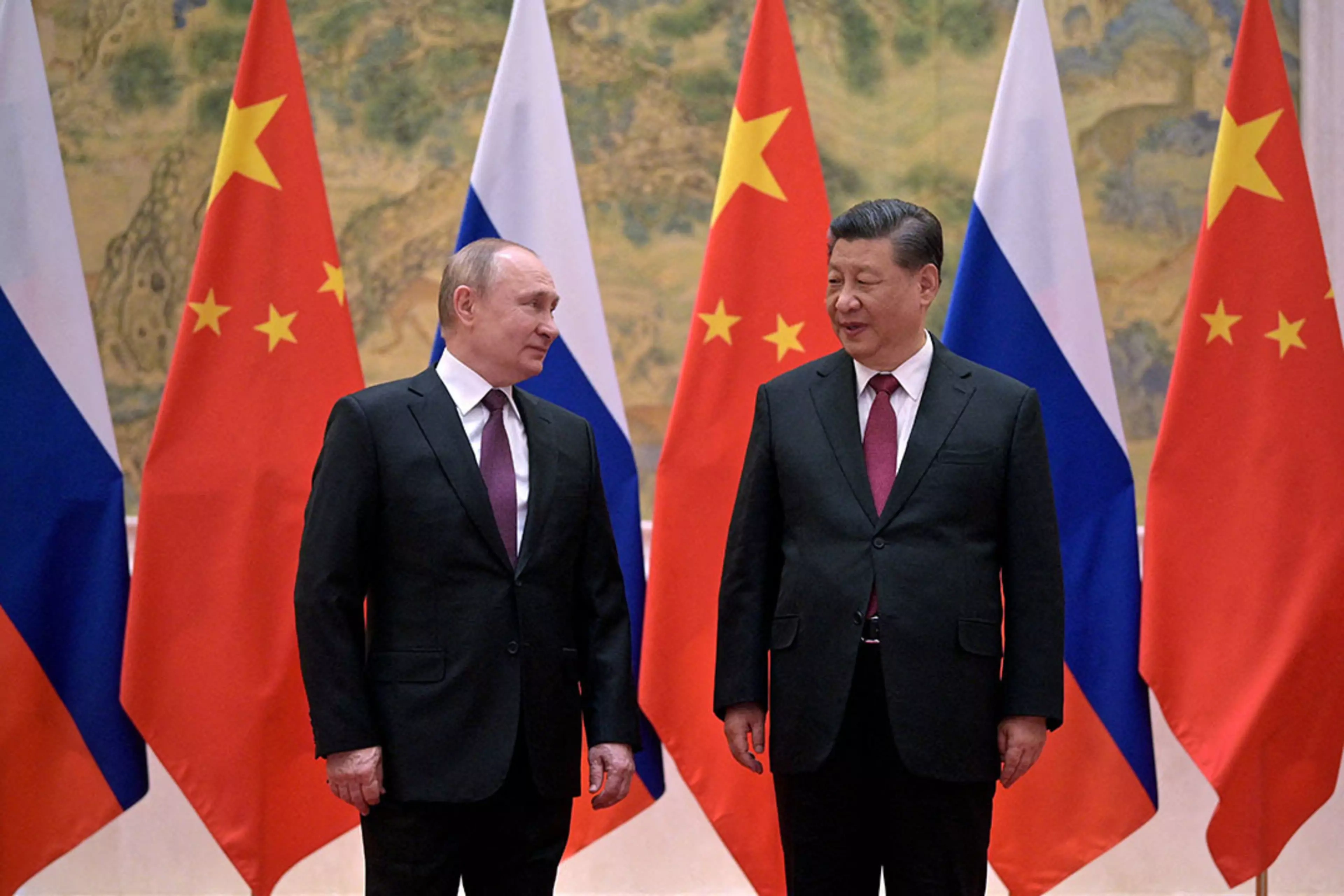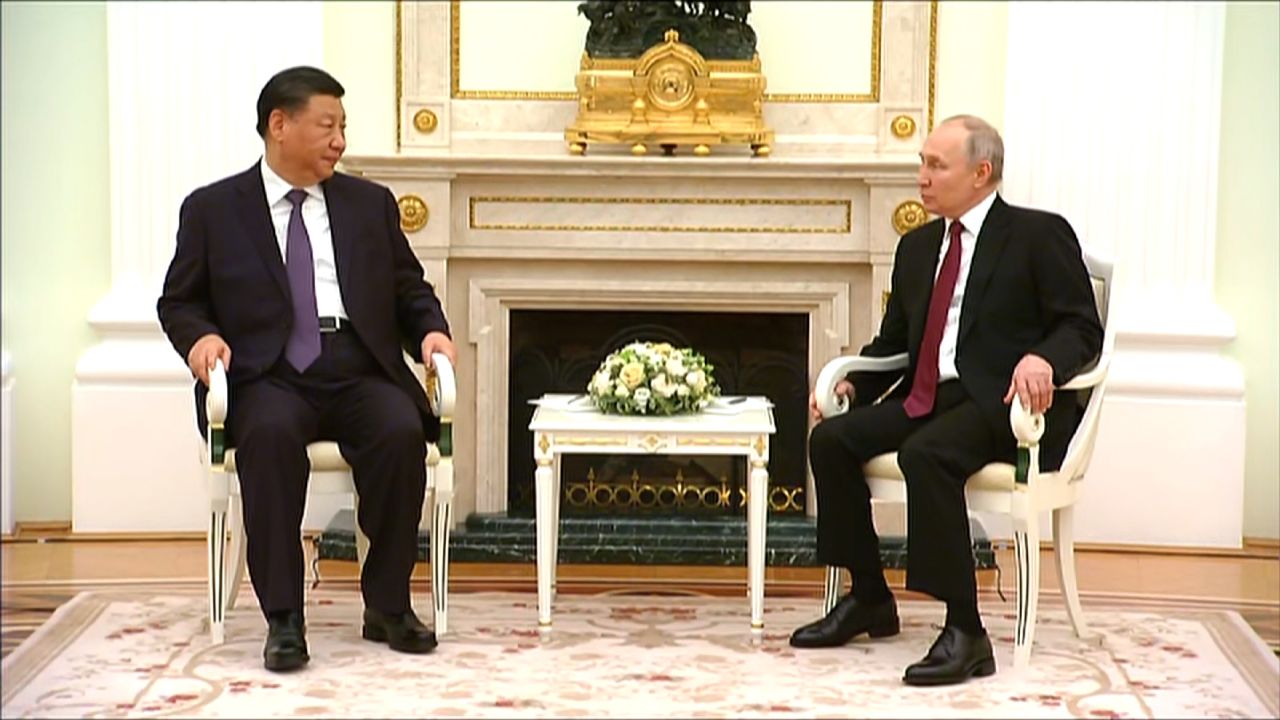Alliances of Useful Expedience
"The scope, scale and complexity of China-Russia cooperation has continued to expand based on a confluence of shared interests and ambitions rooted in competition with the West.""Both China and Russia view their recent history as second-tier powers as an aberration in their otherwise long history as Great Powers.""[The two countries' burgeoning relationship suggests that they are militarily] united, powerful adversaries."Redacted Department of National Defence internal document, May 2021 -- Ottawa"There very clearly are limitations to their friendship. It's kind of like watching two teenagers that have different views of their dating.""One says 'We're in it for life', and the other says 'We'll see how long it goes'.""From a Chinese perspective, this [Ukraine] war is really quite dangerous."Professor Arne Kislenko, international relations, Toronto Metropolitan University
 |
| Russian President Vladimir Putin and Chinese President Xi Jinping meet in February 2022. Sputnik/Aleksey Druzhinin/Reuters |
Consolidating
those ties appeared to be the reason for Chinese President Xi Jinping's
flight to Moscow to visit with Vladimir Putin, the newly-indicted
Russian President. Prior to Russia's invasion of Ukraine on February 24
of 2022, the leaders spoke of a friendship between them personally and
their countries "with no limits". The newly-revealed briefing note for
the assistant deputy minister for National Defence in Canada market
secret, spoke of an existing bond a year prior to that declaration.
Professor
Kislenko from his perch in academia as a professor of international
relations deems the partnership a limited one from China's perspective.
He holds that Beijing may be interested in assisting Russia's economy
through increased energy imports and to provide some empathy for
Russia's growing isolation on the world stage resulting from its
invasion of Ukraine and subsequent actions defying international
standards of sovereignty and war protocols, but actually providing
munitions to Moscow would not be in China's interests.
Were
Beijing to decide to send along arms, it could anticipate a backlash
from the very Western countries that support its export economy and what
is bad for business is bad for China. Similarly, President Xi may view
benefit for China in brokering a peace agreement between Russia and
Ukraine, on the heels of his successful push for detente between Iran
and Saudi Arabia. The kind of diplomatic one-upsmanship that leaves the
U.S. in the diplomatic dustbin. A satisfying turn of events for Beijing.
Not
all that long ago China and Russia were bitterly opposed when in 1961
the Sino-Soviet split occurred and the two rivalled one another for
domination in the global movement of communism leading to a border
skirmish in 1969 that came close to an all-out conflict. At some future
date yet another border disagreement could sour relations between the
two when the country with the largest population on Earth begins to push
further and more Han Chinese settle in Russia's sparsely-populated
Siberia.
Since the end of the Cold War a growing trade in arms and energy led to a strategic partnership in the "political, economic and military spheres",
noted the briefing note. With shared great-power ambitions they have
each other for moral support as both face sanctions and censure for
actions such as Russia's 2014 annexation of Crimea and China's "political assertiveness and military intimidation", according to the document.
At the United Nations their political cooperation is "global in scope"
where they both vote and veto in close alignment. The Ukraine war and
Russia's censure and isolation has in fact, been a boon to China in
accessing more oil and gas from Russia at reduced prices, while giving
Russia the finances it requires to prosecute the war. Because of China's
interest in the increasingly accessible Arctic as a result of climate
change, its investment aids Moscow to build infrastructure there,
allowing Beijing a presence in the region.
All this and more, according to the document sends "geopolitical signals to the West that they face united, powerful adversaries".
The 2019 announcement that Russia is helping Beijing build a strategic
missile early-warning system -- generally the reserve of Great Powers --
further underscores their increasing level of co-operation at the
strategic level."
They appear also to be moving toward "cooperative military activity in the Arctic".
The National Defence experts' analysis posits China and Russia acting
together as a combined challenge for the West. In tandem, in their
spheres of influence, both represent a duo practising aggressive
territorial ambitions; China with Hong Kong and Taiwan, claiming as its
territory disputed areas between its near geographic neighbours, and
Russia eyeing Eastern Europe in its 'near abroad', after the Ukraine
campaign.
"At the invitation of President Vladimir Putin, I will soon pay a state visit to the Russian Federation. Russia was the first country I visited after I was elected President ten years ago. Over the past decade, I have made eight visits to Russia. I came each time with high expectations and returned with fruitful results, opening a new chapter for China-Russia relations together with President Putin.""China and Russia are each other’s biggest neighbor and comprehensive strategic partner of coordination. We are both major countries in the world and permanent members of the UN Security Council. Both countries uphold an independent foreign policy and see our relationship as a high priority in our diplomacy.""There is a clear historical logic and strong internal driving force for the growth of China-Russia relations. Over the past ten years, we have come a long way in our wide-ranging cooperation and made significant strides into the new era."Ministry of Foreign Affairs of the People's Republic of China
 |
| Putin again claimed to Xi that he is "always open to the negotiation process," despite his repeated refusal to engage with Kyiv on a withdrawal from Ukrainian land. VGTRK |
Labels: Beijing China, Common Interests, Cooperation, Military Alliance, Moscow Russia, Renewed Diplomacy

<< Home